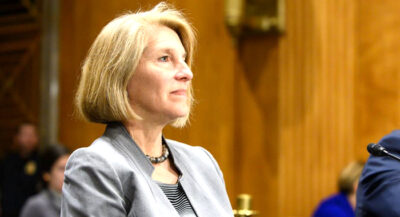House Committee Holds Hearing on U.S. Policy Toward the Caucasus

WASHINGTON, DC – On Wednesday, December 14th, the U.S. House Foreign Affairs Subcommittee on Europe, Energy, Environment, and Cyber held a hearing entitled “U.S. Policy Toward the Caucasus.” The Hon. Karen Donfried, Assistant Secretary of State for European and Eurasian Affairs, U.S. Department of State, was the sole witness. The hearing focused on the South Caucasus countries of Armenia, Azerbaijan, and Georgia, U.S. policy toward each country individually and to the region as a whole.
“The region has a vibrant history” and that it is “situated in a highly geostrategic location as a vital crossroad” of Europe and Asia, Subcommittee Chairman Rep. William Keating (D-MA) said as he opened the panel. He referenced the 2020 Azerbaijan-Armenia ceasefire agreement that “resulted in mass displacement in the Nagorno Karabakh region.” Despite the ceasefire, “skirmishes indeed continue,” Keating said, and “civilians continue to be displaced, many have been wounded or lost their lives, and long term peace agreements remain elusive.” Keating called attention to democratic backsliding in the region, saying, “I continue to call on the Azerbaijni government to protect minority groups” and to “make necessary reforms to establish democratic processes in the country,” since the rule of law doesn’t exist under the Aliyev regime.
During opening remarks, Subcommittee Ranking Member Rep. Brian Fitzpatrick (R-PA) referenced the September 2022 Azerbaijan military attack on the Republic of Armenia and how the “footage of Azerbaijan executions of Armenian prisoners of war and mistreatment of many [Armenian] people have raised concerns and criticism internationally.”
Assistant Secretary Donfriend touched on U.S. policy priorities toward each nation during her opening remarks, including the recent escalation of violence in and around Nagorno Karabakh (Artsakh). In discussing the U.S. mediation efforts between Armenia and Azerbaijan, Donfried stated that “we continue to advocate that the rights and security of Nagorno Karabakh is a key part” of the negotiations. “Since September 2020, the United States has provided over $21 million in humanitarian assistance directly and indirectly,” to Armenians displaced by Azerbaijan’s violent cross border offensive during the Second Nagorno Karabakh War of 2020. “Supporting peace between Armenia and Azerbaijan is the right thing to do and it is in our national security interest,” Donfried said.
“Our bilateral relations with Armenia have never been stronger,” Donfried stated, pointing to the U.S.-Armenia strategic dialogue as the “flagship platform for this partnership.” She cited the May 2022 meeting of U.S. Secretary of State Antony Blinken and Armenian Foriegn Minister Ararat Mirzoyan in Washington, D.C. where both nations signed a nuclear cooperation Memorandum of Understanding as evidence of the elevated partnership.
Turning to Azerbaijan, which Freedom House ranks as the least “Free” of the three South Caucasus nations, “we continue to advocate with the government of Azerbaijan to protect human rights and hold individuals accountable for human rights abuses,” Donfriend said, as the Biden Administration “publicly designated an Azerbaijani official for significant human rights violations on December 9.”
Rep. Jim Costa (D-CA), an active member of the Congressional Armenian Caucus, opened his remarks by questioning “Russia’s ability to be a positive influence” in the region. “I don’t view them as a reliable broker” of peace, he said. “Since the 44-day war and the fallout of 2020, there are still Armenian Prisoners of War (POWs) there are other.. flagrant violations of human rights, was that part of the discussion when negotiators were in Washington?” Rep. Costa asked.
“I can assure you that human rights is a critical part of the conversation,” Donfried responded. “Did you raise this with the Azeri counterparts?” Costa pressed. “Yes,” Donfriend said, “ I spoke with both foreign ministers last week and part of my conversation with FM Bayrimov of Azerbaijan focused specifically on human rights and I did mentioned the designation last week as well. We always raise our pressing concerns about human rights in Azerbaijan,” Donfried said before citing a litany of ways the brutal dictatorship in Baku is guilty of gross human rights violations
“What are we doing to hold AZ accountable?” Costa asked. Assistant Secretary Donfried again pointed to the December 9th U.S. designation of Kerim Heydar Alimardanov (Alimardanov), an official in the Main Department for Combating Organized Crime within the Azerbaijani Ministry of Internal Affairs, for “gross violations of human rights” under the Global Magnitsky Act as a “very concrete example” of a U.S. response.
“Azerbaijan has blockaded the road between Armenia and Artsakh, which is a critical humanitarian lifeline, and gas pipelines have also been shut off to Artsakh, impacting 120,000 people with no heat in the middle of the winter. I don’t think that shows good faith,” Rep. Costa stated, illustrating Azerbaijan’s duplicity toward the U.S., and how they are pretending to act toward peace with phony diplomacy, meanwhile Azerbaijani forces continue to kill more and more Armenians almost every day. “What are the specific steps that we are attempting to take for the Armenians living in Artsakh and what future efforts do we plan to deal with at-risk Armenians in Artsakh?”
In response, Donfried pointed to the statement from State Department spokesperson Ned Price tweeted the night prior to the hearing. “Closure of the Lachin Corridor has severe humanitarian implications and sets back the peace process. We call on the government of Azerbaijan to restore free movement through the corridor. The way forward is through negotiations,” the State Department said.
“This afternoon, as fate would have it, there is a senior Azerbaijani official visiting Washington and I will have the opportunity to discuss this directly with him and I will continue to press for restoring free movement through the corridor,” Donfried said.
“The Biden administration has consistently extended a waiver that allows the U.S. to provide security and other assistance to Azerbaijan even though in violation of human rights,” Costa said. “In light of the human rights abuse [Azerbaijan] committed against the people of Armenia, I think the waiver is a mistake,” Costa exclaimed. “I just, at this point, fail to see the motivation that Azerbaijan wants to ultimately reach a peaceful agreement and I think they’re taking advantage of circumstances,” Rep. Costa said.
Pointing to his long record in support of Armenia and stronger U.S.-Armenia relations, Rep. Brad Schnieder (D-IL) voiced his support for a greater American engagement in the region and how “the U.S. has a critical role to play to protect Armenians against unprovoked aggression” and to “protect ethnic Armenians in Nagorno-Karabakh.”
Congresswoman Susan Wild (D-PA) shared how she has “a significant Armenian American community” in her district and how “many of these constituents are deeply and personally connected to the continuing conflict.” Rep. Wild inquired how U.S. humanitarian assistance was being delivered given Azerbaijani restrictions in the region, highlighting how “Armenians in Nagorno Karabakh continue to face an acute humanitarian crisis, including threats of renewed attacks, chronic shortages of water, and energy, and health care and food.”
This week’s House hearing was the second Congressional panel to focus on the Caucasus region in as many months. On November 16th, the Senate Foreign Relations Committee, led by Chairman Sen. Bob Menendez (D-NJ), held a hearing entitled “Assessing U.S. Policy in the Caucasus.” Assistant Secretary Donfriend and Philip Reeker, Senior Advisor for Caucasus Negotiations, U.S. Department of State, provided testimony in what Chairman Mendendez called “the most disappointing hearing” he had chaired given the Biden Administration’s continued waiver of existing U.S. sanctions on Azerbaijan, which Menendez called “morally repugnant”.
“The Armenian Council of America welcomes these important and timely Congressional oversight hearings, and we greatly appreciate Rep. Costa’s persistent line of questioning,” stated ACA Board Chairman Sevak Khatchadorian. “More needs to be done to ensure that American laws sanctioning Azerbaijan are enforced, including additional sanctions, unless and until the Azerbaijani regime complies with the letter and spirit of U.S. law. Unfortunately, U.S. policy to date has not had the intended effect of preventing war in the region and must be revisited especially in light of recent events. Armenian Americans will continue to push our elected officials in the right direction to ensure a secure, prosperous, and peaceful future for Armenia and Artsakh,” Khatchadorian said.
As a grassroots organization, ACA is dedicated to working with all political leaders, offering Armenian related news, analysis and resources for policymakers, media, students and activists, advocating issues important to Armenian Americans. The ACA also aims to strengthen U.S. – Armenia and U.S. – Artsakh ties, the development of programs promoting sustainable economic growth and good governance in Armenia, while promoting the values and responsibilities of global citizenship.





